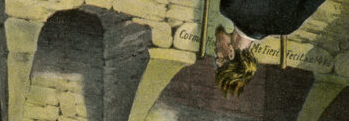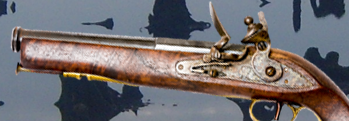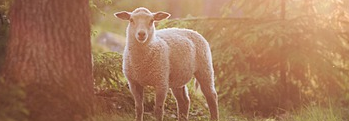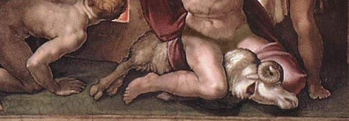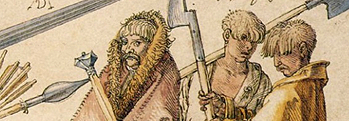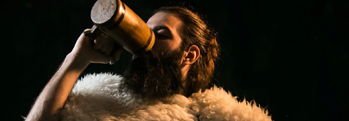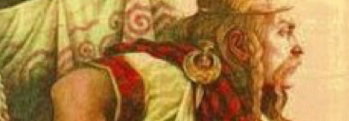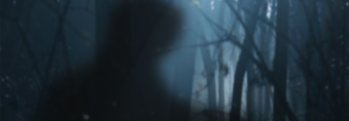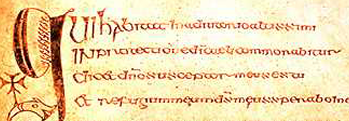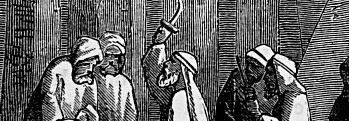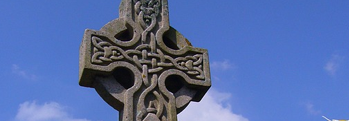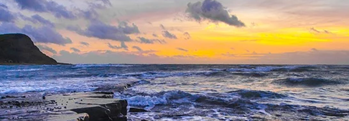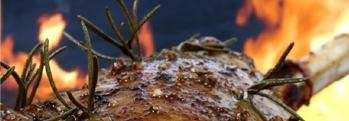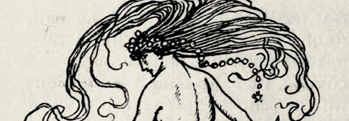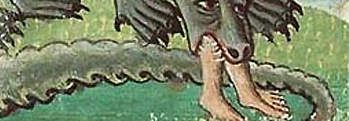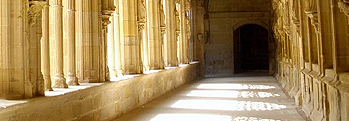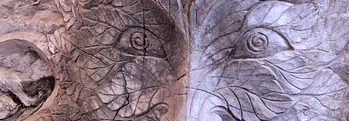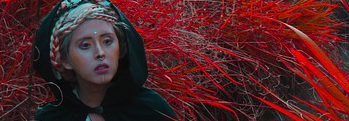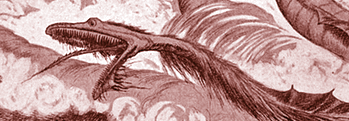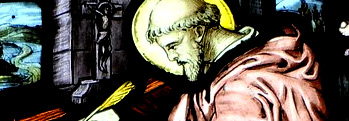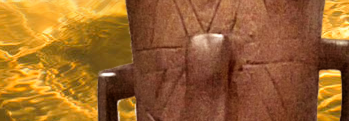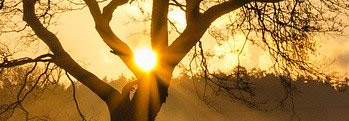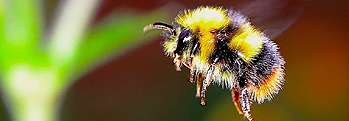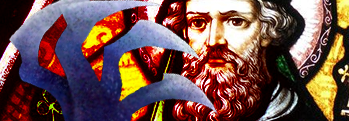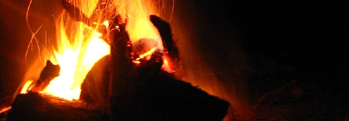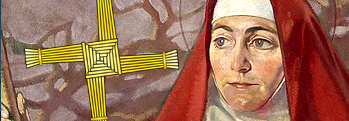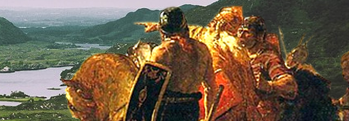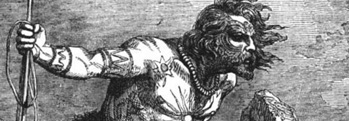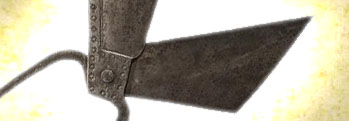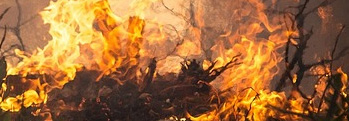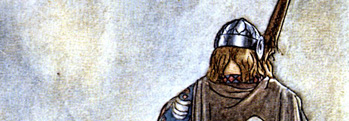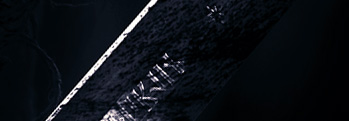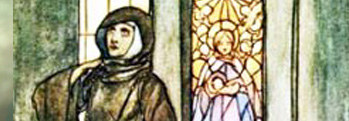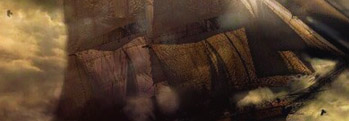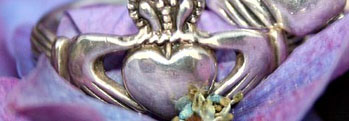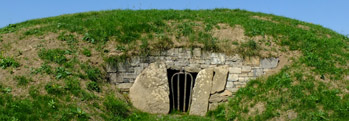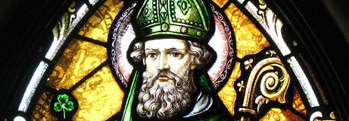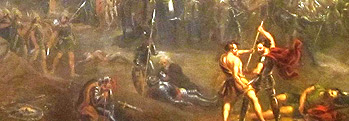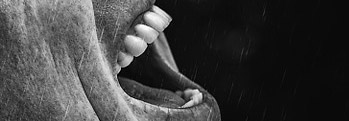The Troubles of Conn
Irish and Celtic myths and legends, Irish folklore and Irish fairy tales from the Historical Cycle
Marry in haste, repent at leisure
I.
 Once upon a time there was a High King in Ireland by the name of Conn the hundred-fighter, for so many battles had he fought and won to gain his kingship. At the end of his reign was Fionn Mac Cumhaill born. Long was Conn's lineage, although I won't trouble you with the details, but he reigned at Tara of the Kings as Lord of all Ireland for nine years.
Once upon a time there was a High King in Ireland by the name of Conn the hundred-fighter, for so many battles had he fought and won to gain his kingship. At the end of his reign was Fionn Mac Cumhaill born. Long was Conn's lineage, although I won't trouble you with the details, but he reigned at Tara of the Kings as Lord of all Ireland for nine years.
During that time, his skill in battle was matched only by the grace and gentle beauty of his wife, Ethne Taebfada, whose name meant “long sides”, daughter of the king of the icy north. He loved her dearly as did all who knew her, and there was nothing lacking to anyone in Ireland during that time.
They would reap the corn three times a year and the cattle grew full and strong. Every child born was healthy and fair, and the waters ran clean and pure from the sacred springs.
But sad to say, beautiful Ethne was not long to be his queen, for after the ninth year she died, and was buried with great mourning and honour in Tailtiúm which was one of the burial places of Ireland, with the other being Brú na Boinne and the last the mound of Cruachán. Poor Conn was miserable and nothing could bring him cheer in the long dark days after her passing, and so it was as though Ireland lacked a king, although in truth, it lacked a queen!
One day it all got a bit much for him and he rode from Tara to Ben Edair where he shouted and wailed his misery. Now although Conn didn't know it, there was a different kind of commotion taking place not far off in the Other World at the same time!
For the Tuatha De Dannan had gathered in angry council to discuss what was to be done with Becuma, the unfaithful wife of Labraid Swift-Hand-on-Sword, who had been caught in congress with Gaidiar, Manannan’s son. Furious they were, and round and round their talk went, growing hotter and hotter like a roaring fire, and that was the sentence they passed upon her.
“Let her be burned!” they cried, but none other than the ancient Lord Manannan stayed their hand.
“Let her not be burned,” he said “in case our name or the good name of this land should be tarnished by the smoke of that deed. Rather let her be cast out forever more from the Land of Promise, and make her way instead among the men of Mile, the Gaels.”
With that judgement fast messengers raced out to every fairy mound in the country, and in many countries unknown even to the wisest, sparks striking purple from their quartz-shod hooves, to pass the word that Becuma should find no place to lay her head in any Sidh.
She was banished beyond the wide ocean and the great deep that lies between the Land of the Young and this world, and they made sure to direct her to Ireland, for they hated the Gaels who had driven them out, and felt she would cause mischief among them.
And I'll tell you, they were not far wrong!
Becuma fled from their wrath in her magical coracle, which is like a little round boat that had no need of rowing, and soon came to Ben Edair. She hid the coracle in a cleft in the rocks in shelter and concealment, for she knew not when she might need that coracle again, and who did she see upon that very moment but High King Conn in his wretchedness!
And he saw her too – wearing green and red silks and cloths, bronze sandals, with fair white skin and long blond hair, he was struck dumb in his mourning by her ethereal beauty the moment he laid eyes upon her.
Very well she knew who he was and came to him with a smile upon her face, and sat down beside him, and told him she was Delbchaem daughter of Morgan, and had come to visit his son Art. He told her that he could see nothing wrong with her, and perhaps she should visit him instead!
Smiling to herself with the cunning of her De Dannan ways, she said that she could make her own choices, and promptly took Conn's hand – but for a bride price. Art, his own son, must be banished from Tara for a year!
For you see it was not the first time she had visited the mortal realms and she was worried Art might know her from their trysts! Conn, it must be said, didn't like the arrangement much, but he was well smitten and that has closed many a man's eye to wisdom, so he agreed.
Art was in Tara playing Fidcheall with Cromdes the druid, and at that moment the old man's eyes narrowed as he saw shadows the future in the board.
“Love for another means the end of your life in Tara,” he declared, and so it came to be. When Conn arrived he told Art that he had to pack his bags and find somewhere else to live for the next year, as it was part of the bride price he had paid.
The men of Tara were not at all impressed and thought it a great wrong, but Art was a good and obedient son, so he duly left that very night, without ever seeing Conn's new wife.
II.
That year was not a good one in Ireland – the milk turned sour, the crops didn't ripen, the wells ran dry, the cows gave no milk and the wailing of babes was heard in every corner of the land. The people of Ireland were in great consternation, and Conn summoned his druids and asked them what he should do to remedy the situation.
They cast their reeds, walked in circles around their temples, turned their stones and consulted all their sciences of the stars, the waters and earth, eventually telling him and the nobles that a dreadful evil had come to Ireland, and it that the son of a sinless couple should be brought to Ireland and slain before Tara, and his blood mingled with the soil. They knew well it was the depravity of Becuma – who hadn't stopped taking other lovers – that wracked the land so, but they dared not speak aloud for they knew how fond Conn was of her.
Conn boldly declared he would go in search of this sinless boy, but said that his son Art should rule Ireland in his absence, and that he should be locked inside Tara until Conn's return, and so the people of Ireland agreed.
Setting out over the deep sea in his coracle, he was a month and two weeks wandering among the seals, the dancing fish and the leviathans, through storm and baking heat, going from one island to the next with only the stars and worlds above for guidance.
At last he came to a strange island where he landed and left his coracle in a secret lonely place. The island was beautiful and rich, with many fragrant apple trees, wells of red wine surrounded by hazel woods, and little bees humming here and there at their sweet industry, sending blossoms into the wells.
He came upon a hall thatched with white, yellow and blue birds' wings, whose bronze doorposts framed doors of purest crystal, and there he met Queen Rigru from the Land of Promise, the wife of Daire Degamra from the Land of Wonders. But as enchanting as her big blue eyes were, his own eyes were drawn to the figure of a little boy sitting behind her on a crystal chair, and he knew this was the lad he sought, whose name was Segda.
Conn sat in the hall and his feet were washed, although he knew not who has washed his feet. A flame rose in the hearth and an invisible hand guided him to the fire, and food-laden boards of the house with varied meats stacked upon them rose up before him, but he knew not who had given them to him
Then he saw a drinking-horn, and knew not who had fetched it. Then the dishes were removed from him, floating away as if by their own volition. He saw before him a barrel finely wrought of blue crystal, with three golden hoops about it, and Daire told Conn go into the barrel and bathe, the better to take his ease.
The next morning, Conn arose feeling fresh and rested, but he told his hosts that he was forbidden to take the first meal alone. They were concerned, for their geas, or magical forbidding, was that they should never break bread with another! But the little boy said confidently that he would eat with the King of Ireland so he would not break his geas. At last they asked him why he had come to visit, and he told them all, leaving out only the part where the boy must be sacrificed, instead saying he must be bathed in the waters of Ireland.
“Alas,” said Daire “we would not lend our son for the king of the world. Never did his father and mother come together except when yonder little boy was made; and moreover our own fathers and mothers never came together except at our making.”
But the little boy Segda was scandalised that the King of Ireland should be refused, and was adamant that he would go, so at last his parents relents, as long as Conn swore to protect him and that he would come back safe again.
“If it can be done, it will be done,” said Conn, and himself and the boy made their way back to Ireland in only three days on the coracle.
All the people of Ireland were gathered in Tara, for hunger and illness tore at them, and when the druids caught sight of the boy, they knew it was the one they sought.
“Give him over here,” they said “that we might sacrifice him to our gods and demons, and by his pure blood mingled with the blighted earth and withered trees, the fruit trees shall blossom and our land shall live again!”
The gathered people, chiefs and kings shouted in anger at the treachery they saw now, but the young boy only bowed his head in sorrow.
Just then they heard the lowing of a cow, and a woman wailing continually behind it, and this unlikely couple made its way into the assembly. As strange as it was, there was something uncanny about the two, which silenced the crowd. She sat herself between Conn and Art, and asked what the shouting was about.
Well when they told her the full story, she shook her sides and shook her head, she tut-tutted and scratched herself, then she looked at the druids.
“Oh ye men of wisdom,” said she, “if you are so wise, can you tell me what is inside these two bags my cow carries?”
“We do not know,” they responded cautiously.
“I know,” she said, “for my cow has come to take the boy's place beneath your knives, let the cow be slaughtered, and her blood mixed with the soil of Ireland, and save the boy. But more important for you – when the cow is cut, let the two bags be opened, and you will find one bird in each – one with one leg, and one with twelve.”
As she said it, so it was done, and the birds were presented for all to see, and no sooner did they appear than they began to fight one another ferociously, much to the old woman's amusement.
“And now we'll see which is stronger!” she cried, and before long only the bird with the one leg was standing. All the people present gathered around to marvel, and she explained the meaning of this wonder.
“You are the bird with the twelve legs, and the little boy the bird with one leg, for it is he who is in the right. Take those druids there,” said the woman, “for it were better for them to die, and let them be hanged.”
The little boy escaped his doom and it was instead visited upon the treacherous druids, then the woman took King Conn aside to have a quiet word in his ear.
“Put this sinful woman away, this Becuma, for it is because of her betrayals that she has been driven out of the Land of Promise.”
“That would be good counsel,” said Conn, “if I were able to follow it! But since I cannot, have you any good advice?”
“Only this,” she said “that Ireland will want for a third of its corn, a third of its milk, and a third of all things for as long as she remains by your side.” And with that she took the boy Segda and went back to the island where he had come from, refusing all jewels and gold that were cast before her.
III.
Becuma was out on the green before Tara then, and she happened to spot Art as he left after these tumultuous events. Upon seeing his fair face and straight limbs again, she declared that he must play Fidcheall with her, or she'd put a forbidding-curse upon him.
A Fidcheall board was brought out and put on the grass, and they played, with Art winning the first game.
“One against you, lady,” he said with a dark gleam in his eye, for he knew her yet knew her not, and knew she was up to no good.
“That is so,” she said.
“So it is I who will put a forbidding-curse upon you!” he declared, “and this curse will bite your heel if you eat food in Ireland before you fetch the sharp spear which Cú Roi mac Dairí had in his hand when conquering Ireland and the great world.”
So in haste Becuma left him and began to search all the fairy mounds of old in all of Ireland, where she found scant welcome, for her name was known, until she reached the Sidh of Eogabal, where Áine welcomed her. She was given a hundred and fifty youths and told that she would find the old fortress of Cú Roi, the royal hound, at the top of the mountain of Sliabh Mis.
Sure enough, just below the surface of the great tomb that lay atop that mountain, she found the spear and returned to Tara with all haste, laying it on Conn's knees.
The Fidcheall board was brought to them again, and again they played, but Art began to notice pieces going missing from the board and being moved around when he was looking away.
“The men of the fairy mound are stealing the pieces and moving them, lady,” he said “it's not you that's winning the game, but them!” Nonetheless they played on and Becuma won this match.
“Now it is my turn!” she exclaimed, “I curse you if a bite of food passes your lips in Ireland bfore you bring to me Delbchaem the daughter of Morgan!”
“But where is she?” asked Art in bafflement.
“in an island upon the wide ocean,” she said primly, “and that's all you'll learn from me!”
So Art packed his bags again and went to the shore near Inber Colptha, where a coracle loaded with food, equipment and other supplies awaited him on the sand. He pushed off and paddled across the ocean from one island to the next, like his father before him, until he came to a beautiful little island amid peaceful waters. Many were the wild apple trees and the cheery birds he saw, and the flowers were adorned with bees like jewels.
Maidens awaited him in a jewelled house whose roof was made of white and purple wings, and there he stayed for four and two weeks, eating from their inexhaustible cauldrons and drinking of their wine. Créide, the lady of the house kissed him three times before he left, wrapping about him a golden cloak from far off Arabia, and she warned him of the dread perils which lay ahead on his long-fated path.
Nonetheless he took what provisions they could give him and lifted his coracle up on his back, walking first through a wood that was travelled as though there were spear-points of battle under one’s feet, like leaves of the forest under the feet of men.
He left the forest and came to the shores of a luckless gulf of the sea, full of dumb-mouthed beasts. On all sides beasts and great sea monsters rose up around the coracle, so Art son of Conn strapped on his war attire and went among them warily. But the beasts were not so careful, swimming close to upset the coracle, so he began to slaughter and maim them until they sank into the dreadful depths, and the ocean turned red as the setting sun!
When he had crossed the gulf he came then to a hard and rocky shore, above which rose an immense oak forest, dense and thorny, with a bitter cold mountain of ice rising higher behind it. Art travelled down a narrow path which wound through the centre of the gloomstruck forest wild, reaching at last a dark house.
Waiting for him in that house were seven hags and a bath of molten lead! And it was not a pleasant encounter for him since the hags pierced, pinched and hacked at him until morning, but his sharp weapons won through in the end.
Art, though weary, went on his way keeping a careful eye out until he came to the venomous icy mountain above, where he crossed a forked glen full of poisonous toads which were lying in wait for any travellers. After that he passed to the Saeb Mountain beyond, where many lions with long manes lay in wait for the beasts of the whole world.
Higher in the mountain he climbed, and the air grew thin and sharp until he reached an icy river, with a slender narrow bridge, before which stood a warrior giant with a pillar-stone. This looming dolmen was used by the giant, whose name was Curnan, the doorkeeper of the house of Morgan, to grind and sharpen his teeth! But no matter how mighty his thews, Art's weapon skills were mightier yet, and the giant fell into the river he had warded.
But no sooner had the giant fallen when Art saw another fierce warrior waiting on the other side of the river! He was mighty concerned and well he should be, for the maidens had told him the name of this man – Ailill Blacktooth he was, well named, a merciless champion who could be harmed by no weapon, nor could fire burn him, and water could not drown him.
Art decided then the best way was to subdue this hero of old by wrestling, and they began a brutal match, slinging insults and curses at one another fit to make the very air sizzle! But Art overcame him too, bending the savage head back so far that his neck snapped, and that was that.
Deciding it was time to take the kid gloves off and get serious, Art went on a rampage through Blacktooth's house, destroying the walls and roof, tearing off the doors and smashing the furniture. In his fury he grabbed Blacktooth's wife and threatened her with great harm unless she told him where to find the girl, who was hidden in Morgan's Dún in the Land of Wonders.
What he didn't know was that in this place also stood Coinchenn wife of Morgan, who had slain a dozen strong-handed warriors in battle before breakfast, two dozen after! The grim folk of these lands had the blood of the titans of old running yet through their veins, and in hers more than most.
It was Coinchenn Dog-Head Long-Head who had sent the hags with the bath of lead to meet him, and the giant Curnan. It was she that had put Ailill Blacktooth in the way of Art son of Conn, because Art would come on that expedition to woo her daughter, as it had been foretold her. And it was she who had contrived the venomous toads, and the icy bridge, and the dark forest, and the mountain full of lions, and the wild sea gulf
For she had been told by the druids that if any man should woo her daughter, in that hour she would die! So she killed anyone who looked even warmly at her daughter.
Art came at last to the stronghold he had sought for so long, and saw before him its walls of sharpened bronze stakes, with a head atop each, except for one which stood empty, awaiting his own head! Within the walls were many houses of fair build, and in the middle was a pleasant palace, from the heart of which arose a tower of gold where the maiden was kept.
She stood at the golden parapet and gazed down upon this prince of the Gaels, her green cloak and golden hair flowing over her snowy-white skin, and her grey eyes were filled with mystery. Fair was the maiden both in shape and intelligence, in wisdom and embroidery, in chastity and nobility.
She waved down and bade him enter, making him welcome and washing his feet, but she told him that they should leave quickly in case Coinchenn should catch him and add him to her wall! But alas, he was too slow, struck by her beauty, and Coinchenn entered, with two other women, Aeb and Finscoth, each bearing a golden cup.
Coinchenn smiled and told Art to drink, but he had been forewarned – one cup contained wine, but the other deadly poison! And so he drank from one and knocked the other aside.
Snarling her fury, Coinchenn leapt to the attack, and Art son of Conn was never a man to refuse a fight! So they duelled on that golden tower amid billowing silks for an hour or more, but once again, it was Art whose war-sciences won, and it was Coinchenn's head which adorned her bronze walls.
After that, mistakenly thinking the worst was over, Art and the maiden Delbchaem lay down merrily and feasted with the whole Dún in their power, but they were awoken by a terrible roar outside the next day! For who had returned by Morgan himself, to find his good wife's head looking down at him from the walls!
Wrath was upon Morgan and he snarled and spat, telling Art to come and fight him, for one or the other of them would not see the sun set.
The young man arose and put on his battle-harness, his satin mantle and the white light-speckled kilt of burnished gold about his middle. He put his fine dark helmet of red gold on his head and lifted his beautiful purple-embossed shield on the arched expanse of his back.
He took his wide-grooved sword with the blue hilt, and his two thick-shafted, red and yellow spears, and they attacked each other!
Art and Morgan like two enormous stags, two lions, or two waves of destruction. But in the end Art overcame Morgan, and he did not part from him until his head had come off his neck.
Then Art took hostages of Morgan’s people and possession of the Land of Wonders. He collected the gold and silver of the land also and gave it all to the maiden, even Delbchaem daughter of Morgan.
The stewards and overseers followed him from the land and he brought the maiden with him to Ireland. They landed at Ben Edair, where the maiden said to hasten to Tara, and tell to Becuma to get herself gone without delay!
So Art went on to Tara and was made welcome. There was none to whom his coming was not pleasing except the wanton and sorrowful Becuma. But Art ordered her to leave Tara, and she rose up straight away, lamenting in the presence of the people of Ireland, without a word of leave-taking, until she came to Ben Edair where her magical coracle awaited her still.
As for the maiden Delbchaem, the seers, the wise men and the chiefs were sent to welcome her, and she and Art came to Tara in great joy and good fortune, telling their tale and making merry.
Ben Edair is marked on the map below.
More Tales from the Historical Cycle
The gift of the gab, as it’s known, is a common thing among the Irish – being able to talk all day about anything and everything, and do it in a way that would have you listen as well. It’s as Irish as red hair and freckles. But what if you didn’t have the gift of the gab, or felt a deficiency of gabbiness? Never fear, al ... [more]
Ireland is full of strange little corners and odd byways that only a few know about, and one such is a mysterious place called the Gearagh, or An Gaorthadh, meaning the wooded river bed, in County Cork. Once it was part of the first forests in Ireland, home to verdant giants that grew after the great ice melted away, but now all that remains is a s ... [more]
Ireland at the beginning of the first millenium was a turbulent place, with many clans and kingdoms fighting among themselves, so that a Lord might be sitting comfortably one day but find himself fleeing for his life the next! And so it was with one of the greatest of Ireland's kings, Cormac Mac Art. Although he was by blood, law and custom ... [more]
On Martinmas eve, that is to say the 10th of November, it used to be the custom in many parts of Ireland to sacrifice an animal to Saint Martin of Tours! This tradition has only recently ceased, having been carried on well into living memory, as lately as the 1940s in some places. In poorer homes a goose, gander, duck or chicken was killed, whil ... [more]
It's true to say that music has a magic all to itself, for it can transport us to different places and times with the strumming of a few notes. It can make us feel angry, or sad, or happy, or any one of a myriad of other emotions. But if you were to hear the music of an occult Sidhe instrument played by one of the fairy folk under a loon's ... [more]
King Cormac Mac Airt was one of the mightiest kings of Ireland, known and well known for his wisdom, but after he lost an eye in a battle with the Déisi, he had to step down, for the solemn law was that a king must be without blemish. His son Cairbre came to him to ask his advice before in turn being crowned king. “O Cormac, grandso ... [more]
"Crom Cruach and his sub-gods twelve," Said Cormac "are but carven treene; The axe that made them, haft or helve, Had worthier of our worship been. "But He who made the tree to grow, And hid in earth the iron-stone, And made the man with mind to know The axe's use, is God alone." Anon to priests of Crom was ... [more]
Most people with an interest in Irish mythology and legends will have heard of the great tale of the Táin Bó Cúailnge, which tells of the heroic deeds of Cú Chulainn as he resisted and gave battle single handed to the armies of Queen Medb. What most don't know is that the ancient tale was once all but lost, for th ... [more]
One of the most legended and powerful relics of ancient Ireland was the Cathach, or battle-book of St Colmcille, who was also known as St Columba. A Cathach was really any sort of sacred or magical artifact, and great was the strife between the tribes and clans of Ireland to gain ownership of them! The psalter or prayer book of Saint Colmcille w ... [more]
Three was a sacred number to the people of ancient Ireland, bearing with it a hint of magic and the sacred, and this belief carried through to their spiritual practices, which occasionally included human sacrifice! Most cultures throughout history have at one point or another practised some form of human sacrifice, and lurid tales passed down fr ... [more]
Saint Colman was a famous Saint in early Irish Christianity, being born a prince not long after Saint Patrick brought the faith to Ireland in the first place. Despite his royal lineage however, his birth was no easy matter, for the druids had prophecised darkly that he would be a great man and surpass all others of his clan! His pregnant mother ... [more]
The old pagan times in Ireland were fraught with peril for even the mightiest warriors, with chieftains and tribes going to war often and for many reasons – pride, hatred, love and greed! And so it was with the fierce King Conall Collomrach. Little is known of his exploits, but his reign was brief and his end was violent, leaving behind only ... [more]
This now is the true tale of mighty King Cathal Mac Finguine of Munster, lord of Cork and warrior without peer. In ancient Ireland this story was told when mead was first brought out, or a prince sat to his feast, or when an inheritance was taken, and the reward for reciting this story was a white-spotted, red-eared cow, a shirt of new linen, or a ... [more]
The river in Meath which we today know as the Delvin, that very same river which flows into the Irish sea in Gormanstown, was not always called so. In the time of Kings it was called Inbher Oillbine, and this is the grim story of how it got that name. There was a prince who lived near to the mouth of the river, and his name was Ruadh Mac Righdui ... [more]
The boy who was to be Saint Colman was born in the northern kingdom of Dalriada, which held both Northern Ireland and Scotland in its power at the start of the sixth century. This was the time of the dawn of Christianity in Ireland, and it was a time when great terrors and monsters from primordial epochs still swam in the deep lakes and lazy rivers ... [more]
Most people have heard of Ireland's famous title, “The Island of Saints and Scholars”, and the reason it was so well known was because of the many fine Irish Catholic universities and colleges that preserved and spread learning throughout Europe. Of them all, there were few finer than the one in Howth, and so wonderful was its reput ... [more]
Very often here in Ireland we walk past the most astonishing buildings, carven stone high crosses, ancient temples and many similar things, but rarely do we wonder who built them. Well as it turns out, legend has it that a surprising number of them were built by a man called Gobán Saor, whose name means “Gobán the Builder,&rdquo ... [more]
I. Once upon a time there was a High King in Ireland by the name of Conn the hundred-fighter, for so many battles had he fought and won to gain his kingship. At the end of his reign was Fionn Mac Cumhaill born. Long was Conn's lineage, although I won't trouble you with the details, but he reigned at Tara of the Kings as Lord of all Irela ... [more]
In the time of High King Lugaid Luaigne, that is around the age when Fionn Mac Cumhaill and his Fianna fought in defence of the great land of Ireland, a dispute arose in the northern Kingdom among the men of the Ulaid, for instead of there being only one king of Ulster, there were two! Well, as anyone who knows anything about kings will tell you ... [more]
St Colmcille is one of the three patron saints of Ireland, and his life is the subject of story and legend. It was by his efforts that Christianity spread not only through Ireland but also Scotland, England and parts of Europe too! He was a tall and powerfully built man with a rich and melodious voice which, it was said, could be heard from one hil ... [more]
From the earliest times and in every corner of the world, mead was held in reverence. This sweet tasting fermented honey drink was especially loved by the ancient Irish, who shared fireside stories about rivers of mead in mystical lands over the edge of the ocean's horizon, ruled by Mannanan Mac Lír, and even in the place where the dead ... [more]
Ancient are the hills and mountains of Ireland, and ancient are her trees, something that the old people who lived here knew well. To them a tree was a mystical thing with its roots reaching down into the underworld of the sidhe mounds, and its branches lifting up high into the heavens towards the sun, moon and stars. Well over ten thousand places ... [more]
The Irish bee has been a beloved part of the culture and folklore as long as there have been people in Ireland, producing honey for cakes and mead as well as beeswax which has no end of uses. Many's the warm summer evening has been filled with their gentle humming above the beautiful flowers they help to pollinate. And yet for all that, old ... [more]
As Saint Patrick travelled across Ireland, spreading Christianity and the light among the pagan tribes, he saw many wonders and defeated many evils, but always more rose up to challenge him. So he took himself to prayer and saw a vision that he should travel to Croagh Patrick – although it was not so known at that time – and spend the L ... [more]
The shifting shadows of pagan times held sway over Ireland when the High King was a man known as Laoghaire, famed for his merciless fury and great strength, and he sat upon the seat of the High Kings in Tara. But unknown to him, Saint Patrick had landed in a little boat at Colpe in the Boyne estuary, travelling to a place called Ferta fer Feic, or ... [more]
One of the three patron Saints of Ireland, along with Patrick and Colmcille, St Brigid of Kildare was a devout Catholic in the very first days of the faith in Ireland. Her feast day is the first of February, which previously had been the pagan festival of Imbolc, halfway between winter and spring. Brigid herself was the daughter of a baptised Ch ... [more]
Through many an ancient legend and tale rings the name of the fierce and powerful druid called Mogh Ruith, meaning “slave of the wheel”. Older legends make him out to be the king of the Fir Bolg, or a druid gifted with many lives by the fairies, or that the name was but a title passed down through generations. Some say he had one eye ... [more]
Ireland has had many high kings, some were wise and kind and others cruel and the holders of grudges, but there were few as great as High King Cormac Mac Art, grandson of Conn of the Hundred Battles and son of Art and Ectach, the daughter of a mighty blacksmith. In his youth he stayed at the hall of the king of the north, Fergus Dubhdedach, but ... [more]
Back in the days of old Ireland when legends walked the earth, before the light drove back the shadows of ancient aeons, the word of a bard was much feared, for the people had no writing, so all of their culture and histories were held in songs and poems by bardic masters. As you can imagine even the mightiest were wary of getting on the wrong s ... [more]
In ancient days there was an Irish King whose name was Labraid Lioseach, known also as Labraid the Sailor for a long voyage he took into fairy seas, and when he came back from that voyage he was never seen without a deep hood over his head, except by one man. That man saw him once a year to trim his hair, and after the King's hair was cut, t ... [more]
It was the custom in Ireland of old to lay geases upon champions, heroes and warriors. These were magical forbiddings, deeds they must not do or disaster would follow, and no disaster fell so hard upon a man who broke his geases as upon Conaire Mor! His mother was a woman of the Sidhe called Etain, who had been married to King Eochaid, but disco ... [more]
Tierna the Historian was one of the many chroniclers and monks who wrote the tales of ancient Irish legends, telling us of strange and notable events in the almost forgotten past, the deeds of heroes and kings, and in one case, the disappearance of the High king himself! For it was by Tierna's hand we know that High King Cormac went missing for ... [more]
In the time between the Tuatha Princes and St Patrick, there rose over the people of Ireland mighty High Kings, who held power by force of arms, wit and wisdom. One of the greatest among them was Cormac of the wide purple cloak, whose hair was as golden as the heavy torc around his neck, with teeth like a shower of pearls and skin as fair as snow. ... [more]
Long ago when the fierce Milesians invaded Ireland and defeated the De Danann after many wars and battles, despite their sorceries and all their courage, skill and sciences, the folk of Danann made for themselves eldritch amulets and charms by which they and all their possessions became invisible to mortals, and so they continued to lead their old ... [more]
The Tailteann games were a grand affair in Ireland once upon a time, every bit as celebrated and renowned as the Olympics are today. Having their roots thousands of years earlier, in the time of the Tuatha Dé Danann, lakes were made and gigantic fires were lit during Lughnasadh, the summer feast in July. Druids and poets would compose cea ... [more]
The Claddagh Ring is one of those well known emblems of Ireland that most people recognise, but how many know the stories behind it? Many's the young man has gifted one to his lady, giving his heart along with it, as did the ring's original maker. Back in the seventeenth century there was a young Irish lad by the name of Richard Joyce, w ... [more]
Ah Tara, Temair of old, seat of more than a hundred High Kings of Ireland for better than a thousand years, home to the royal lines of Cormac and Tuathal, where is your wisdom and beauty? Where are the mighty warriors and poets who once danced in your halls? Why now do cattle and livestock graze where the mighty Fionn faced the Tuatha sidhe with a ... [more]
On Easter Sunday morning, in anno domine 433 it was that Patrick came face to face with the beating heart of the old religion at Tara, and did battle with the Druids. Although some might dispute the miraculous nature of the events that took place on that day, few argue they didn't happen, so take from that what you will! Laeghaire the king a ... [more]
Brian Boru was one of the greatest High Kings of all Ireland, a Christian king whose small dynasty challenged and broke even the power of the O'Neills, who had ruled Ireland from time immemorial. He rose to prominence at a time when the cruel Norseman was pillaging the lands of both Ireland and England, slaughtering and slave-taking, barbarians ... [more]
King Suibhne was master of the northern land of Dalriada in Ulster, and a grim and fierce king he was too, yet fair to behold like palest snow, with deep blue eyes. A mighty master at arms, he was called to war often, but latterly to the bloody battle of Moy Rath. As he readied himself he heard in the distance a church bell ringing, and no man of G ... [more]




